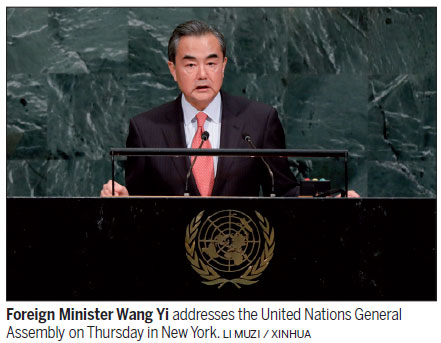Negotiation offers the only way out of the Korean Peninsula crisis, and there should be no new nuclear state in both Koreas or elsewhere, Foreign Minister Wang Yi said in New York on Thursday.
"There is still hope for peace; we must not give up," Wang told world leaders at the annual UN General Assembly.
"Negotiation is the only way out, which deserves every effort. Parties should meet each other halfway by addressing each other's legitimate concerns."
Wang made the remarks at a time when rhetoric and even personal abuse have flared up in recent days between Washington and Pyongyang. The Democratic People's Republic of Korea confirmed that it conducted another medium-range ballistic missile test on Sept 15.
US President Donald Trump ordered new sanctions against the DPRK on Thursday, a day after threatening to "totally destroy" the Asian country. The DPRK's leader Kim Jong-un issued a rare statement on Thursday, branding Trump as "deranged" and warning he will "pay dearly" for his threat.
"We urge the DPRK not to go further on along a dangerous direction," Wang said. "We call upon the US to honor its 'Four Nos' commitment, and we call upon all parties to play a constructive role in easing tensions."
The "Four Nos" refer to Washington's promise not to seek a regime change in Pyongyang, not to seek the collapse of the DPRK government, not to seek acceleration of reunification of the Korean Peninsula, and not send its military north of the 38th Parallel, which acts as the boundary between DPRK and ROK.
Wang also recalled that the statement of the six-party talks, signed on Sept 19, 2005, opened up new vistas for regional peace and stability, and inspired hope for peaceful settlement to disputes.
Apart from the two major concerned sides, the six parties also include China, Russia, South Korea and Japan.
It was in this statement, the DPRK undertook to abandon all its nuclear programs and the US undertook to normalize its relations with the DPRK. All parties committed to setting up a permanent peace mechanism for the peninsula.
Twelve years have passed, some may think that things have changed on the peninsula and the joint statement has become outdated, Wang said.
"But we believe that things following the progressive trend of the times never become outdated and decisions on the right side of history never become obsolete."
The minister said that if there is any change that is needed, it is denuclearization that is more comprehensive, more thorough, and more irreversible.
"There should be no new nuclear weapon state, whether it is in the north or south of the peninsula, whether it is in the Northeast Asia or other parts of the world," Wang added.
Wang also said that in China's view the day when the denuclearization of the peninsula is realized, should also be the day when a peace mechanism is established.
The Chinese foreign minister also met separately with the DPRK Foreign Minister Ri Yongho and Japanese Foreign Minister Taro Kono on Thursday in New York.
At the UN Security Council meeting on non-proliferation of weapons of mass destruction on Thursday, Wang highlighted the importance of pushing for the resumption of dialogue and negotiation while exercising sanctions on DPRK.
Contact the writers at [email protected]

